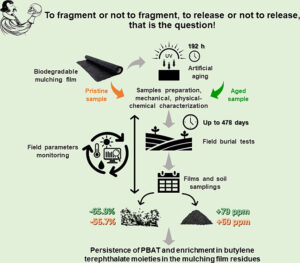

A recent study by the Università degli studi di Bari has taken a deep dive into the fate of biodegradable mulch films (MFs) made of starch and PBAT (butylene-adipate-co-terephthalate, a type of polyester) after being buried in agricultural soil for 16 months in an experimental field in southern Italy.
Key findings highlight the following:
– Both fresh and UV-aged films degraded over time, but not completely. After 478 days, about 23 % and 17 % of the initial amount of BIO-0 and BIO-A192 (film materials) respectively were left in the soil.
– The starch in the films broke down faster, while the polyester part (PBAT) held on longer, leaving behind microplastic residues.
– UV-aging actually accelerated starch degradation, while the breakdown of PBAT was slower, leading to a stronger microplastic release to soil.
– Microplastics were leached into the soil, raising concerns about their long-term impact on soil health and the environment.
These results highlight the complex nature of agricultural plastic films and demonstrate that climate and soil conditions play a major role in how these materials decompose, highlighting the importance of real-world field studies.
This research emphasizes also the need for further investigation into the long-term impact of biodegradable MFs on our soils and ecosystems. With the growing use of biodegradable plastics in agriculture, it’s crucial to understand how they really behave in different environments.
Read the full study here: https://www.sciencedirect.com/science/article/pii/S0048969724048460?via%3Dihub